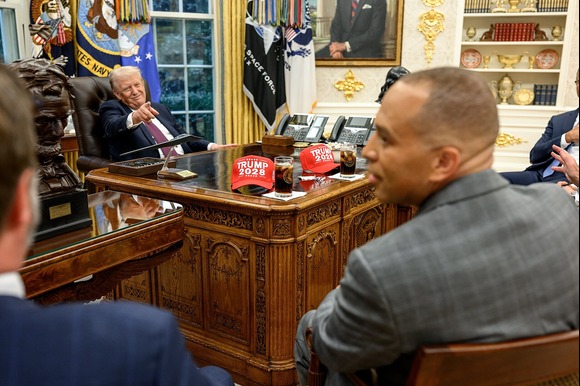A day after the US Senate approved a spending bill to end the longest government shutdown in American history, attention now turns to the House of Representatives, where the next chapter of the budget battle will unfold.
The lower chamber is expected to vote on the measure later this week. Unlike the Senate, House Republicans hold enough seats to pass the bill without Democratic support — but their margin is extremely tight, leaving little room for internal dissent.
As the House prepares to deliberate, several key challenges loom large, threatening to delay or derail the budget before it reaches President Donald Trump’s desk for final approval.
Healthcare: A Political Flashpoint
A central point of contention remains healthcare. Democrats are pushing to attach a renewal of tax credits that help make health insurance more affordable for 24 million Americans. Senate Republicans, however, offered only to allow a vote on the matter in December — a concession Democrats had already rejected weeks earlier.
House Speaker Mike Johnson has not committed to granting such a vote in his chamber, heightening political risks for Republicans. If the subsidies expire, premiums could surge, giving Democrats a potent campaign weapon ahead of next year’s midterm elections.
Conservative Republican Marjorie Taylor Greene has broken with President Trump, warning her party to prevent a spike in insurance costs.
Republicans are debating their own proposal, which could involve capping income eligibility for the tax credits and redirecting funds directly to individuals rather than insurance firms. The specifics, however, remain unclear.
Divisions Within the Democratic Ranks
Though Democrats remain out of power in Washington — with Republicans controlling both the House and Senate — they recently found renewed momentum after election wins in Virginia, New Jersey, and New York City. Yet those victories have also deepened rifts between the party’s progressive and centrist factions.
The progressive wing is furious with Senate Democrats who sided with Republicans to pass the spending bill, calling it a betrayal. Senator Bernie Sanders condemned the decision as a “horrific mistake,” while California Governor Gavin Newsom described it as “surrender.”
Representative Greg Casar, chair of the House Progressive Caucus, warned: “A deal that doesn’t reduce healthcare costs is a betrayal of millions of Americans counting on Democrats to fight for them.”
Still, moderate Democrats may break ranks to support the legislation. Jared Golden of Maine, a centrist representing a conservative district, is expected to vote in favor of the bill, according to Axios. Henry Cuellar of Texas also signaled willingness to cooperate, writing: “It’s past time to put country over party and get our government working again for the American people.”
GOP Unity Faces a Stress Test
With a narrow 219–213 majority, House Republicans can afford to lose only two votes if they hope to pass the spending measure. While most are expected to align with President Trump, fiscal hardliners are voicing objections.
Kentucky Representative Thomas Massie, known for opposing temporary funding deals, is likely to vote against the bill. Senator Rand Paul, also from Kentucky, voted no in the Senate, criticizing the plan for adding approximately $1.8 trillion annually to the nation’s $38 trillion debt.
The Senate-approved plan funds the government only through January, while the conservative House Freedom Caucus seeks a longer-term deal that would impose stricter limits on federal spending.
Travel Disruptions Could Complicate House Return
Speaker Johnson has kept the House out of session for nearly seven weeks during the shutdown, in part to pressure Senate Democrats into negotiations. He now wants lawmakers back in Washington immediately, with a vote tentatively planned for Wednesday afternoon.
However, travel disruptions could hinder the return. Airlines have reduced flights by 6% nationwide as air traffic controllers — working unpaid during the shutdown — continue to call in sick.
Adding to the chaos, record-cold temperatures and heavy snowfall across the Great Lakes and Midwest regions are causing further delays, complicating efforts to reconvene Congress.
As Washington braces for another showdown, the question remains whether House Republicans can hold together long enough to push the bill through — and finally bring an end to a shutdown that has tested the patience of millions of Americans.






